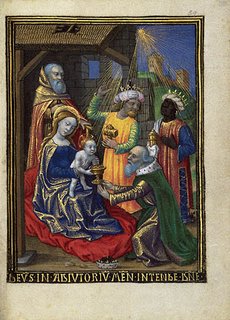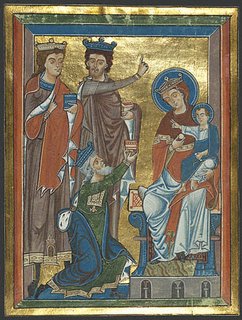Every January, a question inevitably arises from my Byzantine friends about why Western "Epiphany" focuses on the Adoration of the Magi, while Eastern "Theophany" deals with Christ's Baptism. The word Epiphany means a "shining forth," or manifestation of God to the world. Originally, the feast
commemorated many manifestations of Christ: His birth, the visit of the Wise Men, the Baptism in the Jordan, and His first miracle at the Wedding at Cana. (The East
also remembered Christ's presentation in the Temple on Jan. 6th.) Gradually, Christ's Nativity came to be celebrated on December 25th, but Epiphany continued remained a polyglot holiday. Western hymnography still preserves this, as evidenced by the Magnificat antiphon for the second Vespers of Epiphany:
Now do we celebrate a holy day adorned by three miracles: today a star led the wise men to the manger; today water was made wine at the wedding feast; today Christ vouchsafed to be baptized of John in Jordan that He might save us, alleluia.
(For a more in depth examination of the feast's hymnography, click
here.) Western Epiphany came to focus on the Magi, highlighting Christ's manifestation to the Gentiles. The Byzantines moved this to Christmas Day, which is why the
Gospel reading for Christmas Liturgy is the Adoration of the Magi. This also explains the fusion of Christmas with the visit of the Wise Men in nearly all the
Byzantine Nativity "propers," particularly its beautiful Troparion.
The Occidental Kalendar, by lengthening the period dedicated to Christ's infancy, underscores the awesome paradox that the Second Person of the Trinity became incarnate as a little child for our sake. In addition to prolonging the joy of Christmas, this allows the faithful to "grow up with Christ," to savor the life of Christ made mystically present again through the Church year. When we next encounter Christ, on the First Sunday after Epiphany, He is a 12-year-old boy -- the ancient age of manhood -- holding the priests and doctors of the Law spellbound in the midst of the Temple. The Baptism of Christ receives its own commemoration on the Octave of Epiphany, January 13th. The following Sunday celebrates Christ's first miracle at the Wedding at Cana. Subdeacon Benjamin Andersen has noted, "Many of the other Sundays after Epiphany center on other 'manifestations' of Christ...the healing of the leper in Matthew 8; our Lord's calming of the wind in Mark 4," and the parables revealing the Church acts contrary to human expectation and finally showing Christ as eschatalogical judge.
I dearly love the Byzantine Rite. But too often during Christmastime, I feel as though I'm watching one of those old sitcoms where the mother has a baby in February, and by the beginning of the next season, he's in school. On the
Sunday after Theophany, Christ calls His Disciples and from there, the Byzantine Church depicts His ministry. Although both kalendars must "rubberneck" by the time they observe Candlemas, the commemoriation of the presentation of Christ in the Temple (Feb. 2), the Byzantine perspective seems further removed.
Which brings out a last, hidden significance found in Epiphany: in a sense, this holiday itself calls for a Western Rite. Christ called all nations to His banquet, and today all symbolically kneel by His creche. The liturgical differences found within Orthodoxy between Western and Eastern Rites developed because of the cultural differences existing in the lands where the Apostles planted the Gospel (and, in Rome, the chief Apostles died for it). The underlying structures of all traditional liturgies are quite similar, because they have a common Parent. These are merely the ancient, traditional ways the various tribes of man offer the Holy Trinity their sacrifice of praise and thanksgiving. Fr. Paul Schneirla, Vicar-General of the Antiochian Western Rite Vicariate, addressed this in an April 1962 article in
The Word magazine,
"The Significance of the Western Rite," in which he discussed the reunion of Western liturgies with the Orthodox Church:
A primary result of this reunion is that the Church proclaims her catholicity.
She demonstrates that she is the Oecumenical Church, not a tribal
religion...Here is a greater empire than even Byzantium. All peoples may come
before the throne in their own garb, presenting their distinctive gifts.
That truth is most emphatically expressed today, when Christ calls universal nations to His dazzling light, to partake of the uncreated light, the light that came down from Heaven and lighteth every man that cometh into the world.
Labels: Feast Days


